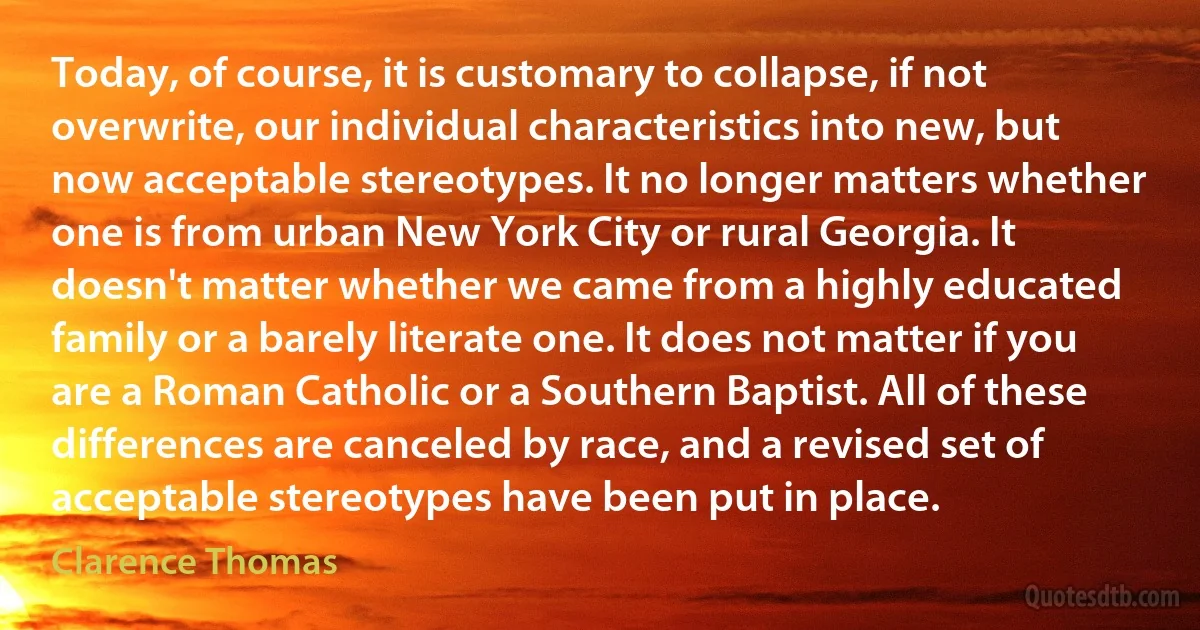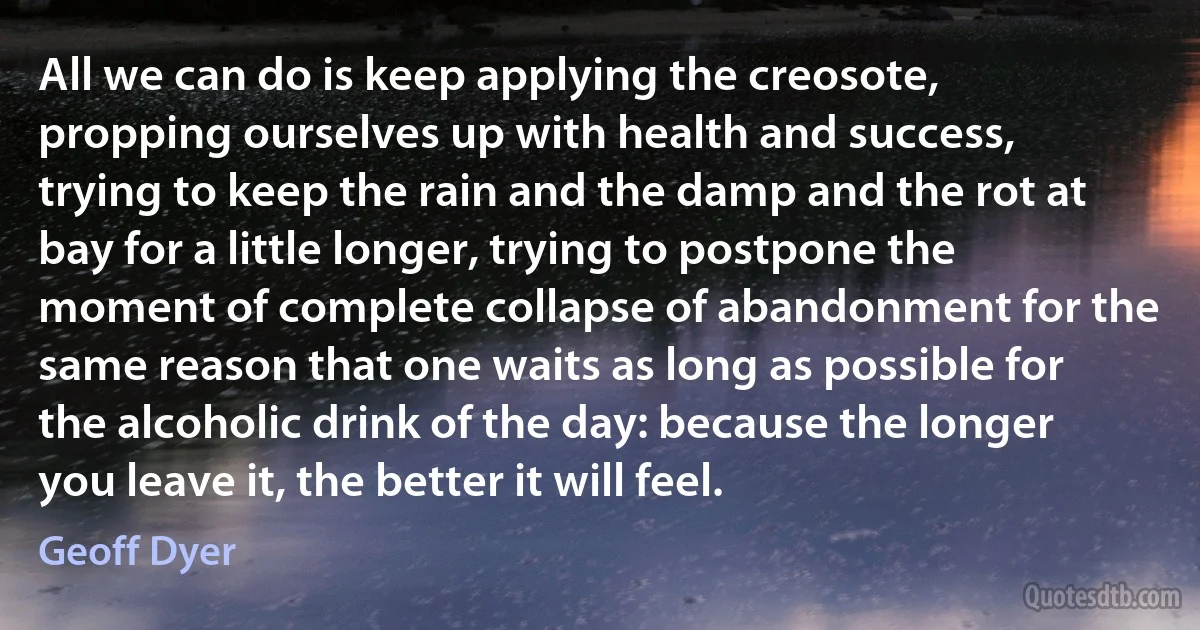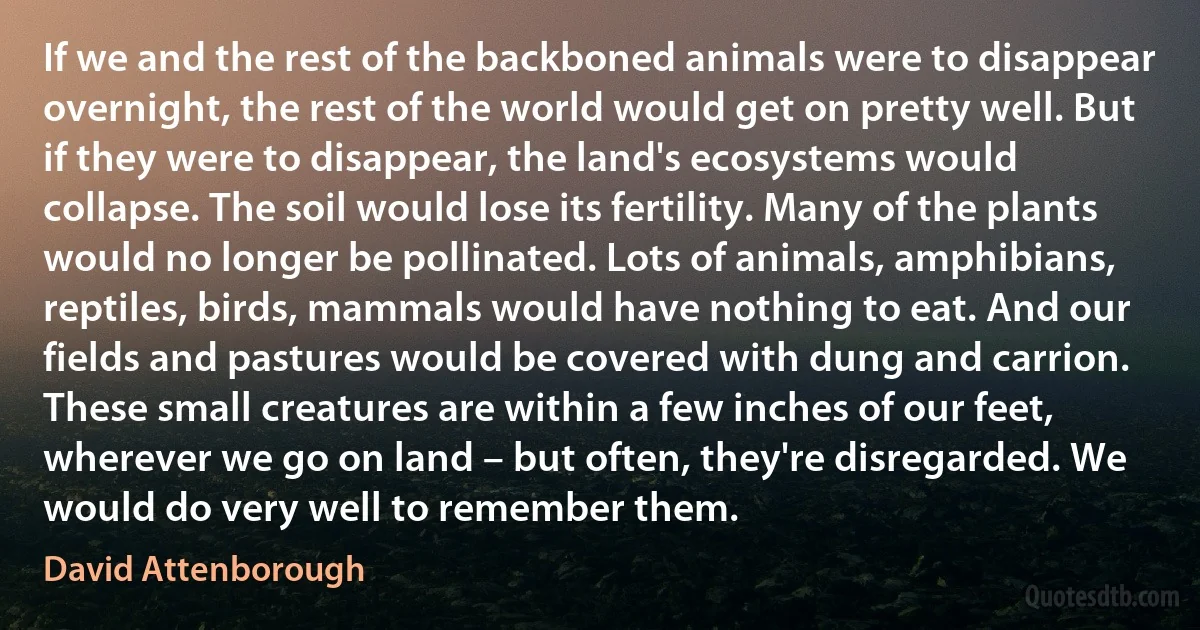Collapse Quotes - page 4
With the collapse of the old welfare states, all this has come to seem decidedly quaint. As the language of antibureaucratic individualism has been adopted, with increasing ferocity, by the Right, which insists on "market solutions” to every social problem, the mainstream Left has increasingly reduced itself to fighting a kind of pathetic rearguard action, trying to salvage remnants of the old welfare state: it has acquiesced with–often spearheaded–attempts to make government efforts more "efficient” though the partial privatization of services and the incorporation of ever-more "market principle,” "market incentives,” and market-based "accountability processes” into the structure of the bureaucracy itself.

David Graeber
Paul Tillich wrote that all institutions, including the church, are inherently demonic. Reinhold Niebuhr asserted that no institution could ever achieve the morality of the individual. Institutions, he warned, to extend their lives when confronted with collapse, will swiftly betray the stances that ostensibly define them. Only individual men and women have the strength to hold fast to virtue when faced with the threat of death. And decaying institutions, including the church, when consumed by fear, swiftly push those endowed with this moral courage and radicalism from their ranks, rendering themselves obsolete.

Chris Hedges
The belief that we can maintain current levels of consumption, especially of animal products, capitalist expansion, imperial wars, a reliance on fossil fuels and abject subservience to unfettered corporate power, which has solidified the worst income inequality in human history, is not a form of hope but suicidal self-delusion. We are not headed under the policies of the Biden administration and the global ruling elite for the broad sunlit uplands of a new and glorious future, but economic misery, vast climate migrations, waves of new and more virulent pandemics, of which COVID-19 is a mild precursor, along with irreversible ecological systems collapse and frightening forms of societal breakdown, authoritarianism and neofascism.

Chris Hedges
I did say in print, in February, 1929 that there was no hope for economic recovery in Europe before American interest rates came down. That wouldn't be until the American boom collapsed - which was likely to happen within the next few months.And this did, in fact, happen in October 1929.
What made me expect this, of course, was one of my main theoretical beliefs - that an inflationary boom cannot be maintained indefinitely. I was sure that a very unstable situation was created by the artificial prolongation of the boom in 1927, when the Federal Reserve tried to stave off a collapse by credit expansion.

Friedrich Hayek
Technology moves with terrifying speed. If the traffic rules are explicit and understandable, and accompanied by common-sense protective designs, this technology will be an incalculable boon to America, a shot in the arm to our international competitiveness, and a stimulus to our creative industries. If not, then the information superhighway, cyberspace, the Internet, call it what you will, technology will collapse the great wonder of intellectual property. The country will be the loser. Big time.

Jack Valenti
Always remember, as bad as it may be for you, it is worse for the lost. They may have it better for a while if they go along with the beast and take his mark, but that "better” will come to an end. Those who obeyed Hitler had it good, too-for a few years. The lost face some of the same problems of economic collapse, wars, earthquakes, PLUS, they will be here for the next 1,040 days of God's wrath being poured out after the rapture and THEN eternity in the Lake of Fire!

Kent Hovind
In the sea of people we are after all but a drop in the ocean, and we can administer only when we express correctly what the people are conscious of. Unless we do this the Communist Party will not lead the proletariat, the proletariat will not lead the masses, and the whole machine will collapse.

Vladimir Lenin
The intelligence recedes, no more a tool of learning - because knowledge is based on experience - but a tool of the outside world it is deprived of knowing. It tries to contact other minds by telepathy; it becomes the Ancestor. Words and Numbers come to hold mystic significance: they were invented by some arcane magic older than man. The line between the word and the thing vanishes; the intervals of numbers in infinity collapse with infinity.

Jack Abbott
Why must we stand firm on the party's leadership over the military? Because that's the lesson from the collapse of the Soviet Union. In Soviet Union, where the military was depoliticized, separated from the party and nationalized, the party was disarmed. When the country came to crisis point, a big party was gone just like that. Proportionally, the Soviet Communist Party had more members than we (Communist Party of China) do, but nobody was man enough to stand up and resist.

Xi Jinping
As for one-party rule, it was questioned neither by the Left Opposition nor by the Right [wing of the Communist party]. All were prisoners of their own doctrine and their own past: all had worked with a will to create the apparatus of violence that crushed them. Bukharin' s hopeless attempt to form a league with Kamenev was no more than a pitiful epilogue to his career. In November 1929 the deviationists performed a public act of penance, but even this did not save them. Stalin' s victory was complete; the collapse of the Bukharinite opposition meant the triumph of autocracy in the party and in the country. In December 1929 Stalin' s fiftieth birthday was celebrated as a major historical event, and from this point we may date the "cult of personality". Trotsky' s prophecy of 1903 had come true: party rule had become Central Committee rule, and this in turn had becorne the personal tyranny of a dictator.

Leszek Kołakowski
Reification, the essential tendency of capitalism, can never be wholly realized. If it were, if the system were actually able to change individuals into things moved only by economic "forces,” it would collapse not in the long run, but immediately. The struggle of people against reification is, just as much as the tendency towards reification, the condition for the functioning of capitalism. Capitalism can function only by continually drawing upon the genuinely human activity of those subject to it, while at the same time trying to level and dehumanize them as much as possible.

Cornelius Castoriadis
When I checked into a hospital [in Germany, after having been beaten by police in Sichuan], I was told there was bleeding in my brain and I was near fatal collapse. I was rushed into surgery. When I awoke I felt like a normal person again. But I will not feel whole until I and my fellow Chinese can live freely.

Ai Weiwei
To elevate every desire, however obscene, into a good because it is desired may be the way of all flesh, but it is not the way of the Cross. And the moral anarchy which is said to pervade our youth...is not going to be countered by lowering the demands of religion, but by insisting on them. The notion that to enlist the support and enthusiasm of youth it is necessary to condone their vices is entirely to misjudge them, and to forfeit their respect. The churches are much more likely to fail in the long run because they demand too little than because they demand too much of human nature. The real tragedy of the position in which the young find themselves to-day arises from the collapse of the orthodoxy of past generations, and the failure to replace it by a confident coherent faith applicable to the conditions of to-day. Principles may be eternal, but their embodiment must be temporal.

Stanley Baldwin
The subject of this book is the structure of space-time on length-scales from 10-13cm, the radius of an elementary particle, up to 1028cm, the radius of the universe. ...we base our treatment on Einstein's General Theory of Relativity. This theory leads to two remarkable predictions about the universe: first, that the final fate of massive stars is to collapse behind an event horizon to form a 'black hole' which will contain a singularity; and secondly, that there is a singularity in our past which constitutes, in some sense, a beginning to the universe.

Stephen Hawking
Make a list of all the environmental and social problems that today afflict us and our poor battered planet. – not just the extinction of species and animals and plants, that fifty years ago was the first signs of impending global disaster, but traffic congestion, oil prices, pressure on the health service, the growth of mega-cities, migration patterns, immigration policies, unemployment, the loss of arable land, desertification, famine, increasingly violent weather, the acidification of the oceans, the collapse of fish stocks, rising sea temperatures, the loss of rain forest. The list goes on and on. But they all share an underlying cause. Every one of these global problems, environmental as well as social becomes more difficult – and ultimately impossible - to solve with ever more people.

David Attenborough
The 'new theory of money and the cycle' which is spoken of in the opening paragraph is of course Hayek's. It was from Hayek that I began - where I got to will be seen. Even at the end, I was minimising my differences from Hayek. I could do so because, as I have elsewhere explained (Economic Perspectives, p. 141n), I still thought, like Pigou and Robertson, and Hayek, but by that time unlike Keynes, that 'we were talking about fluctuations, which, since they did not result in complete collapse or complete explosion, could not have engendered an expectation of going on forever. Booms could then be considered as times of high prices, slumps as times of low prices - with regard to some norm, which throughout the which throughout the fluctuations would not be changed, or not much changed'.

John Hicks



